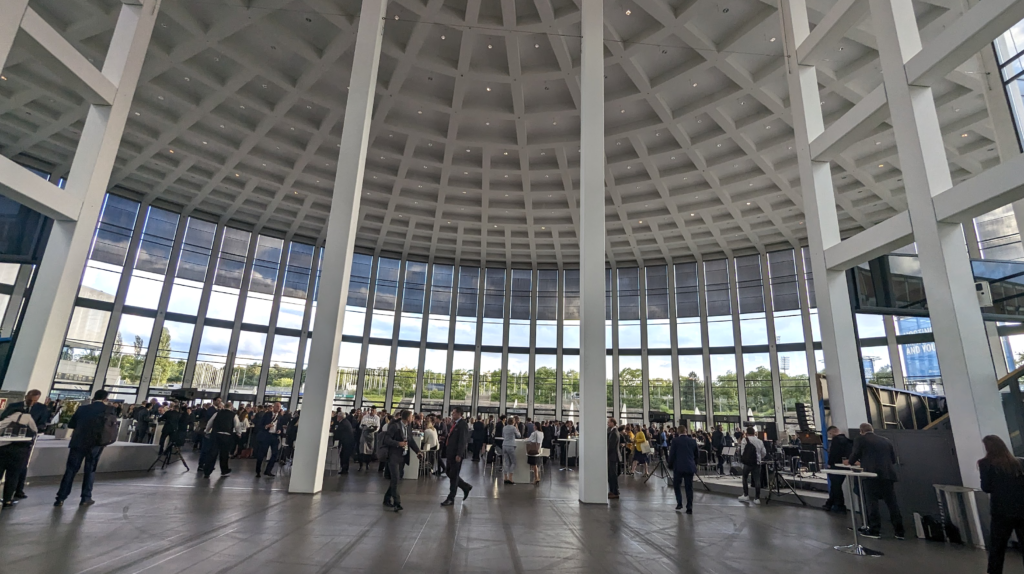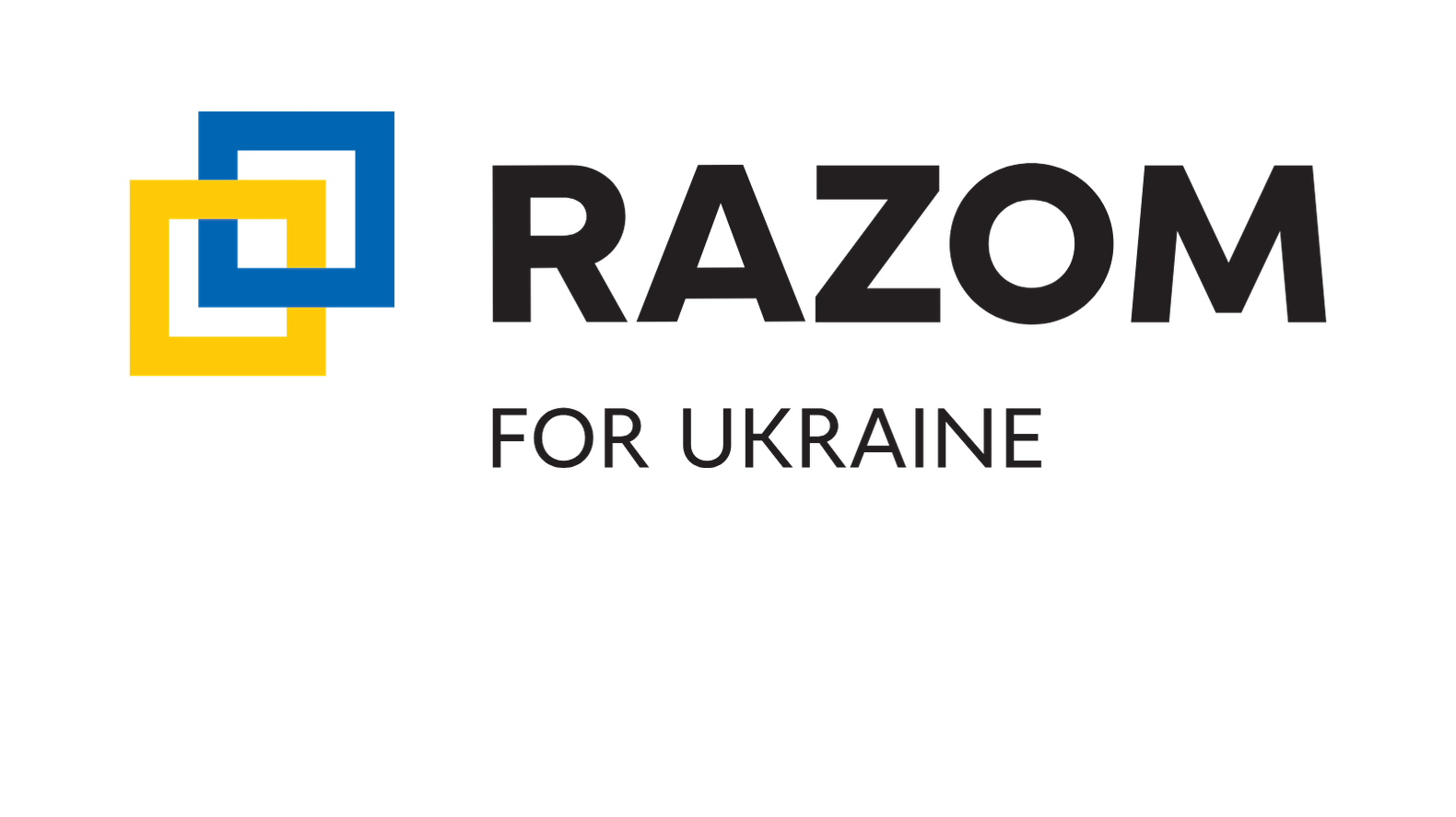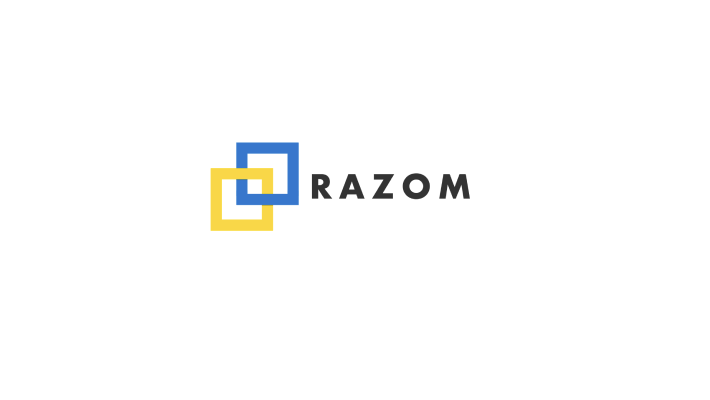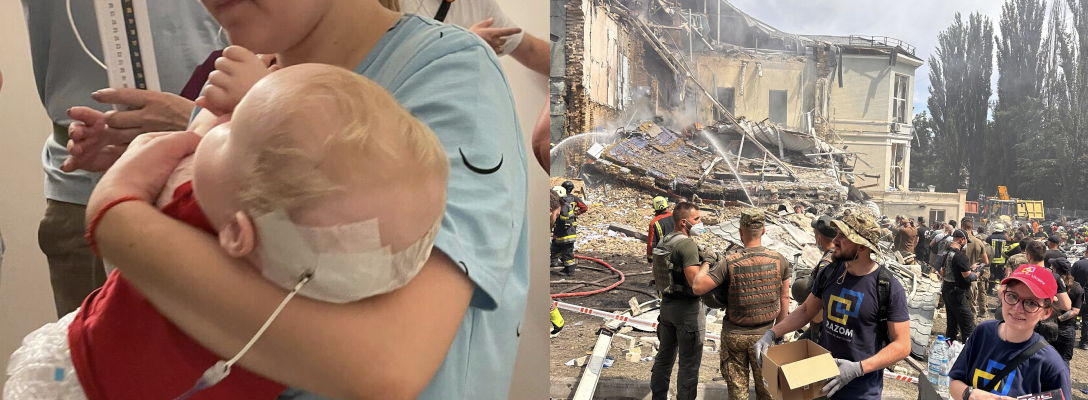Ukraine at Davos 2025: Innovation, Resilience, and the Global Stage
At the World Economic Forum in Davos, Razom for Ukraine, alongside Nova Ukraine, stepped onto one of the world’s most influential platforms to ensure Ukraine’s voice was heard. As the world’s top leaders gathered to discuss the future of technology, sustainability, and global security, we made it clear: Ukraine is not just a country at war—it is a country building the future.
Taking Up Space, Shifting the Narrative
At Davos, we engaged with global influencers, policymakers, and investors, reinforcing our role as a trusted bridge between Ukraine and the world. Our participation wasn’t just about awareness—it was about action. We inserted Ukraine into the conversations that matter, showcasing how Ukrainian innovation and resilience are shaping global trends.
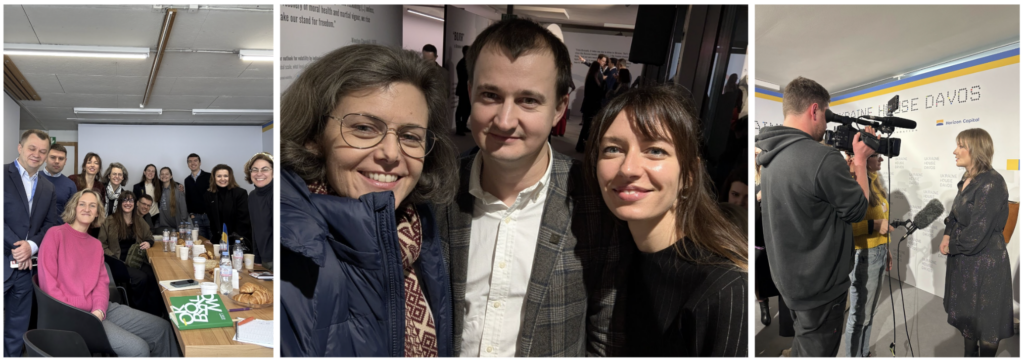
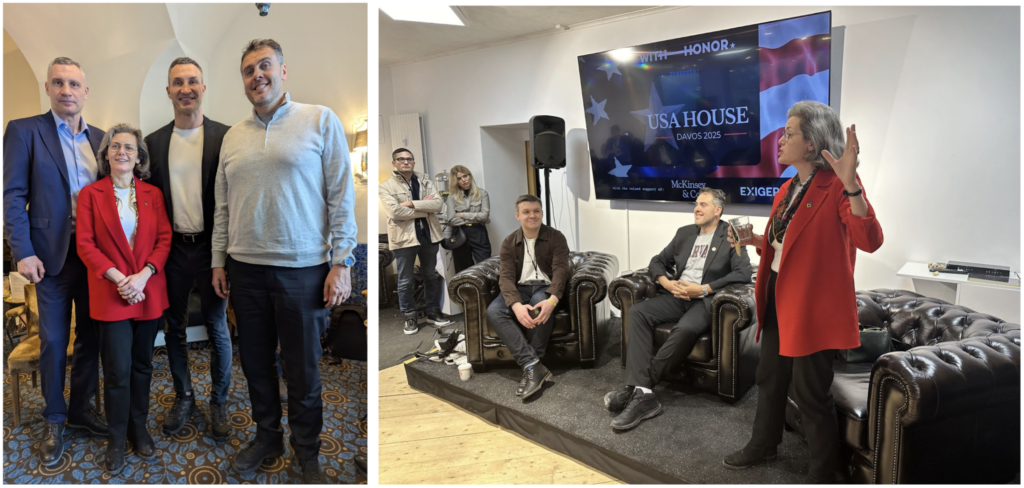
Key Highlights from Our Participation:
🔹 Davos Lodge Panel: The Power of Innovation—Ukraine’s Key to the Future
Razom and Nova Ukraine hosted a powerful discussion on Ukraine’s technological leadership and innovation. Moderated by Dora Chomiak (CEO of Razom for Ukraine), the panel featured Mariam Naiem (Independent Researcher & Author), Yaroslav Azhnuyk (Founder & CEO of TheFourthLaw.ai), and Nick Bilogorskiy (Founder of Nova Ukraine & Managing Partner of Dnipro VC), who highlighted Ukraine’s contributions to sectors like AI, cybersecurity, and drone technology.
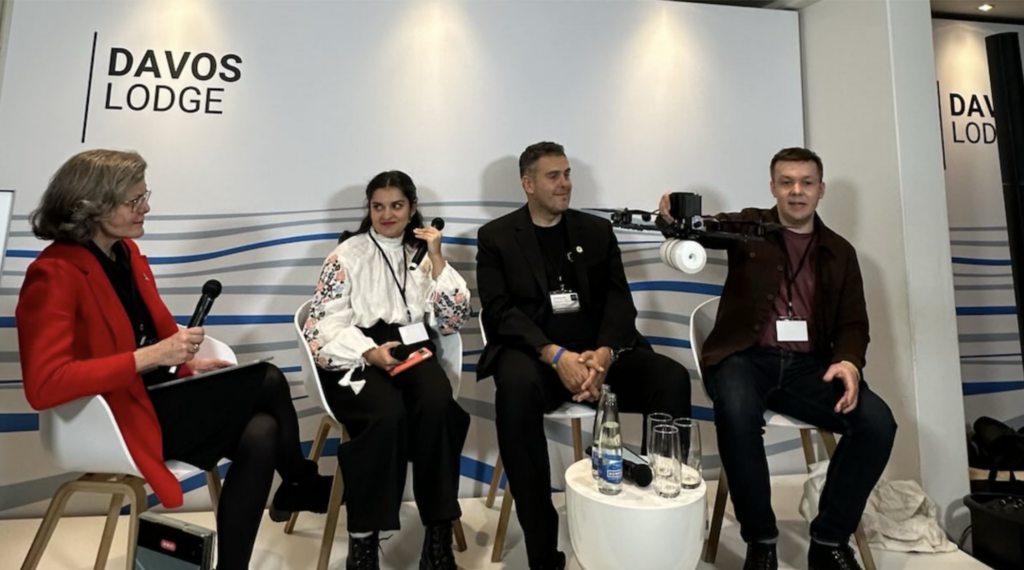
🔹 Freedom & Democracy: More Than Just Words
Mariam Naiem delivered an inspiring reflection on the Ukrainian meaning of ‘freedom’, reinforcing why Ukraine’s struggle is a fight for democratic values worldwide.
🔹 Ukraine as an Innovation Hub
Yaroslav Azhnuyk presented Ukraine’s advancements in drone technology, illustrating how Ukrainian engineers are pioneering defense innovations at an unmatched scale. Nick Bilogosrskiy highlighted Ukraine’s tech ecosystem, citing global successes like Grammarly and MacPaw as evidence of the country’s resilience and talent.
Watch full panel here:
🔹 Ukraine House Davos Panel: Aligning Interests—The U.S., Ukraine, and a Path to a Just and Sustainable Peace
Dora Chomiak, CEO of Razom for Ukraine, joined a high-level panel discussion on Ukraine’s economic potential and geopolitical role. Participants included Daniel F. Runde (Senior Vice President at CSIS), Ambassador Kurt Volker (Founder of Alliance Strategic Advisors), RDML (Ret.) Michael Hewitt (Co-Founder & CEO of IP3 Corporation), and Andy Hunder (President of the American Chamber of Commerce in Ukraine). The conversation explored Ukraine’s role as a future economic powerhouse, its path to EU integration, and the investment opportunities that will shape the country’s recovery.
Watch full panel here:
🔹 Justice & Accountability: Seizing Russian Assets
Yuliya Ziskina, Razom Senior Legal Fellow, spoke on the crucial issue of seizing $350 billion in frozen Russian assets, arguing that the financial burden of war should shift from Western taxpayers to the aggressor. Her message was clear: the legal mechanisms that promote justice, accountability, and sustainable recovery for Ukraine are there, we just need the political will to use them.
Watch full panel here:
Why This Matters
Ukraine’s participation at Davos was more than symbolic—it was strategic.
• Together with our partners we made sure Ukraine was included in key discussions on global security, democracy, and economic development.
• We connected with decision-makers, investors, and media to advocate for concrete support for Ukraine’s future.
• We demonstrated that despite the war, Ukraine is actively contributing to solving some of the world’s greatest challenges.
What’s Next?
Razom together with our partners will continue to push Ukraine’s presence on the global stage, ensuring that its resilience, innovation, and leadership are recognized and supported. We invite you to join us in this mission—advocate, invest, and stand with Ukraine.
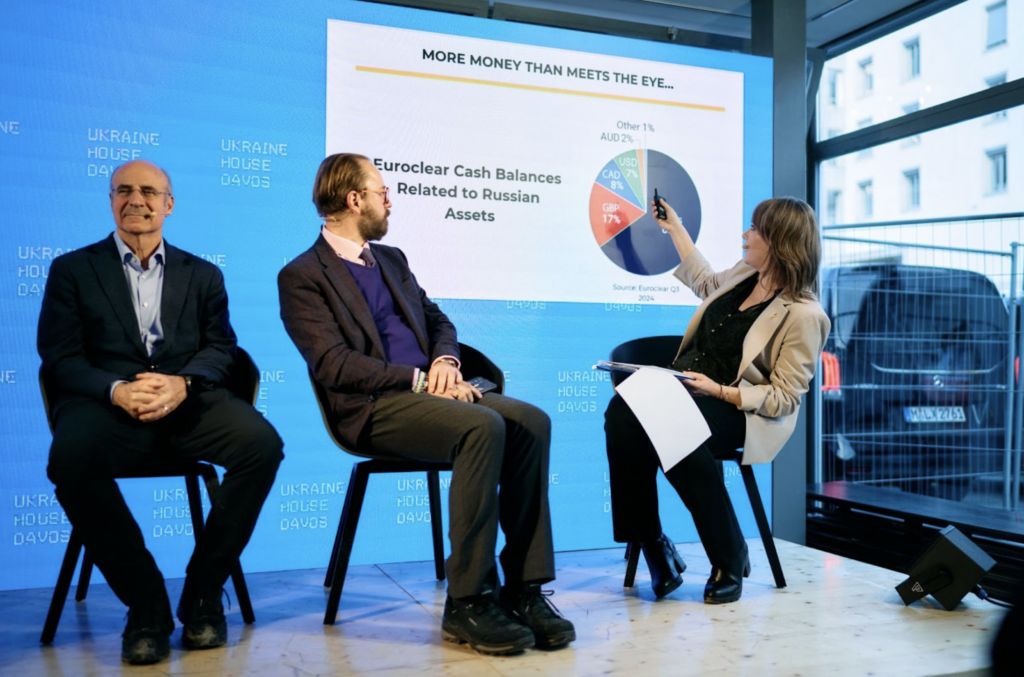
Key Messages for Pro-Ukraine Advocacy
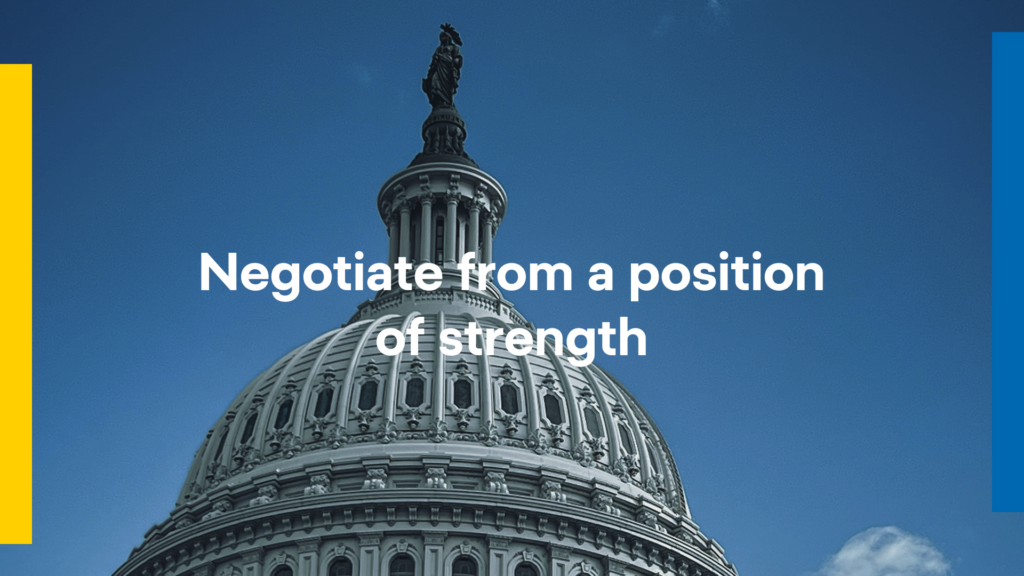
Negotiate from a position of strength
President Donald Trump is preparing to open negotiations for a settlement to Russia’s invasion of Ukraine. No one wants peace more than Ukrainians—but they need a permanent and just peace, which can only be accomplished with U.S. support and historic, bold leadership from President Trump. As allies, the U.S. and Ukraine must negotiate from a position of strength over Russia. It’s time for President Trump to put Maximum Pressure on Russia through sanctions, unleashing American energy, and stopping Russia’s battlefield advances in order to force Putin to the table.
• Arm Ukraine so it can stabilize the front line, stop Russia’s bombardment of civilians, and start pushing Russian forces back again.
• Russia is under pressure—it’s running out of manpower to fight, it’s about to run out of tanks and cannons, and the economy is at risk of a recession. Putin is under tremendous pressure at home and abroad—just look at how he couldn’t save his client Bashar al-Assad in Syria—it’s time for the U.S. to squeeze Putin to force him to make peace, not give him a reprieve.
• The Biden administration refused to properly sanction Russia’s energy or financial sectors. It’s time for President Trump to unleash sanctions and American energy exports to break Russia’s war economy and force Putin to the table to end his war.
President Trump has signaled that he’s open to economic pressure on Russia, but Maximum Pressure won’t work without military assistance to Ukraine. Thanks to U.S. weapons, Russia has suffered record casualties on the battlefield—if this battlefield pressure lets up, Trump’s economic pressure will fail.
Joe Biden failed to properly arm Ukraine to succeed on the battlefield—it’s on Trump to act decisively and fix this mistake to achieve peace. Congress has equipped the Trump administration with a $3.8 billion dollar Presidential Drawdown Authority for Ukraine. President Trump must immediately make a new Presidential Drawdown to give Ukraine leverage for peace.
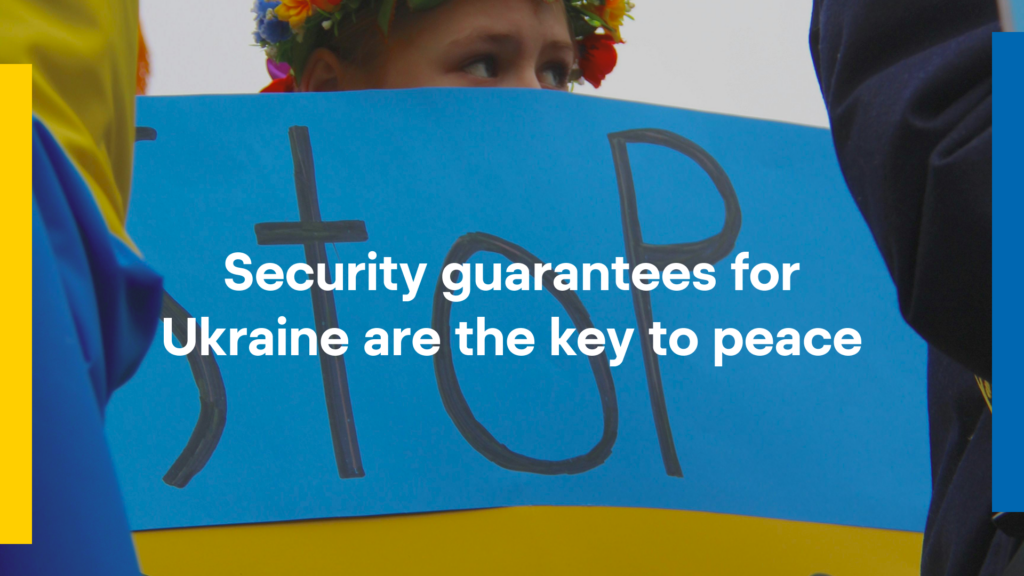
Security guarantees for Ukraine are the key to peace
The only way to achieve real peace in Europe is for Ukraine to receive credible security guarantees such as NATO membership. NATO is a defensive alliance that will never attack Russia—the only threat it poses to Putin is it stops him from trying to conquer more free countries. Without security guarantees, Ukraine won’t be able to rebuild itself. The only way to assure Ukrainians that Russia won’t restart its war in a few years is by boldly acting and finally allowing them to join NATO. Barack Obama and Joe Biden both left Ukraine in NATO’s waiting room—President-elect Trump must fix this by letting the strongest military in Europe be a U.S. ally.
• When Ukraine joins NATO, it will automatically make the alliance stronger and make Europe more secure. President Zelenskyy has suggested that once Ukraine joins NATO, Ukrainian forces could help reinforce bases in Europe to give the U.S. the necessary flexibility to meet security challenges in the Indo-Pacific region.
• Vladimir Putin is trying to trick President Trump into thinking that Ukrainian neutrality will end the war—it’s just another Moscow hoax. Putin wants Trump to make the same mistakes that Obama and Biden made and leave Ukraine in no-man’s-land so that Russia can rearm and restart the war in a few years. Trump must fix Obama and Biden’s mistake and finally let Ukraine help the U.S. as its strongest ally.
• Europe must step up and take ownership of security on the continent as President Trump has called for. In addition to buying American arms, it can do this by providing an intermediate security guarantee while Ukraine joins NATO to end the war. At Ukraine’s invitation and with enablement from the U.S., European troops should help enforce a ceasefire and European fighter jets should stop Russia’s bombardment of Ukrainian cities.
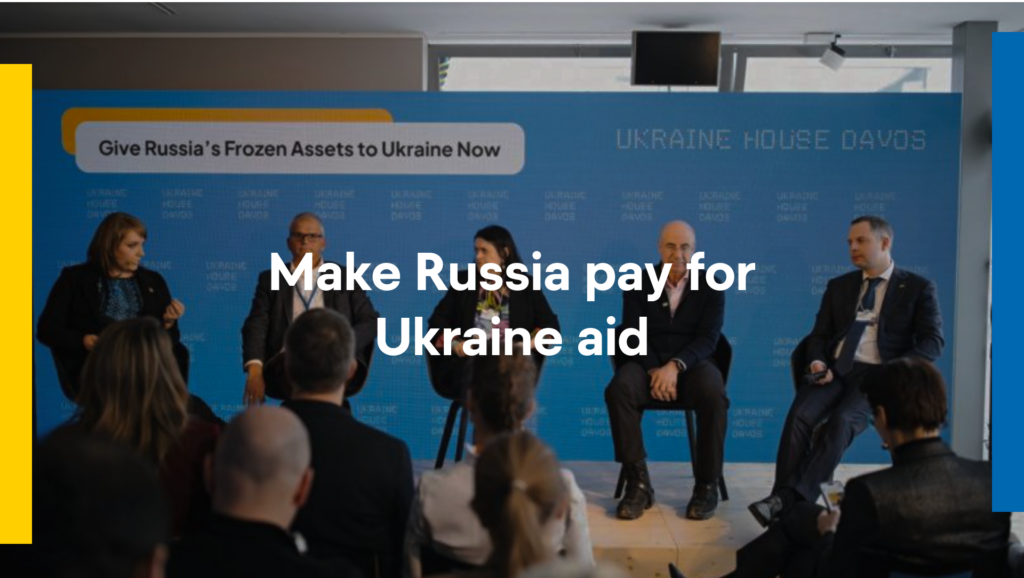
Make Russia pay for Ukraine aid
Congress passed the REPO Act last year, giving President Trump the power to transfer the more than $5 billion in Russian state assets in the U.S. to help Ukraine. Speaker of the House Mike Johnson said it would be “pure poetry” for Russia to be the first to pay for aid to Ukraine, and President Trump should do what Joe Biden refused to—use Russia’s own money to pay for aid to Ukraine.
The Biden administration also violated the REPO Act by failing to disclose a report on the true value of Russian state assets in U.S. jurisdiction, which experts believe are worth tens of billions of dollars. Once President Trump acts decisively on this issue, Europe will follow his leadership and make use of the hundreds of billions of dollars worth of Russian state assets in European jurisdiction.
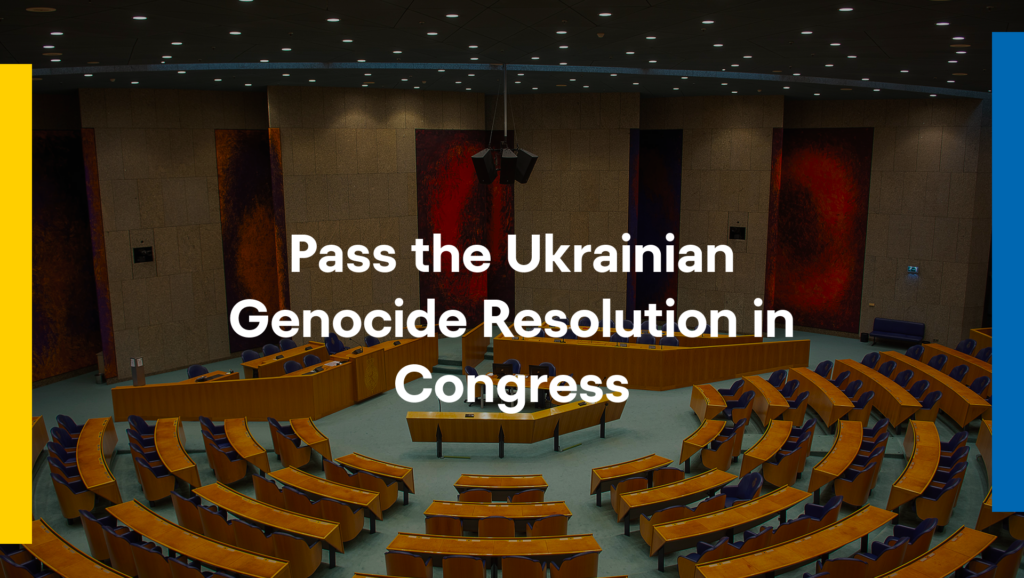
Pass the Ukrainian Genocide Resolution in Congress
Rep. Steve Cohen (D-TN) and Rep. Joe Wilson (R-SC) reintroduced a resolution recognizing Russia’s war against Ukraine as genocide (H.Res.16). It’s time for the House of Representatives to pass this resolution and rightly recognize Russia’s barbaric invasion, annihilation of Ukrainian cities, and mass abduction of Ukrainian children as genocide.
Razom’s Statement on the 2024 U.S. Presidential Election
Razom Volunteers Targeted in Airstrikes While Delivering Aid in Sumy Region
On the morning of September 13, Razom’s volunteers came under heavy airstrikes while delivering humanitarian aid to Yampil Hospital in the Sumy region. As they were unloading supplies, two air-dropped bombs (KABs) exploded just 100 meters from the hospital. Thankfully, the volunteers and hospital staff escaped serious injury. However, the hospital’s windows were shattered, and vehicles, along with the much-needed aid, were damaged by shrapnel.
Immediately after the attack, the hospital began receiving injured civilians, mainly women, children, and the elderly. Under extremely difficult conditions, the medical staff provided urgent care, even relocating to the hospital’s basement for safety.
Yampil, located just 7 miles from the Russian border, has been enduring nearly daily airstrikes, according to local residents.
In response to the worsening situation in Sumy and nearby regions, Razom for Ukraine launched an emergency program to supply hospitals in Sumy with essential medications, orthopedic equipment, and other critical materials. With today’s delivery to Yampil and previous deliveries to Sumy, Khotin, Shostka, and Hlukhiv, Razom has now provided nearly 10 tons of humanitarian aid, valued at $200,000.
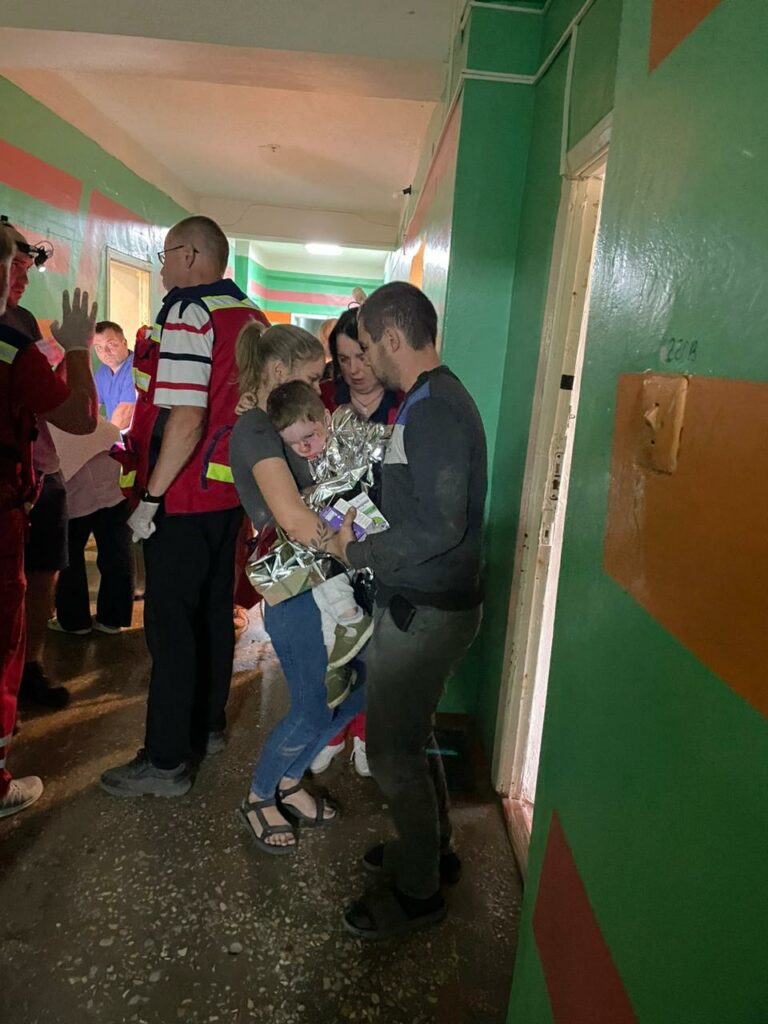
Razom needs your help!
Innocent Ukrainians and volunteers are being targeted while delivering humanitarian aid. Let’s also remember the recent Red Cross tragedy on September 12, where three workers lost their lives in a similar attack.
Support Razom for Ukraine to replace the damaged vehicle and continue delivering life-saving aid across Ukraine. Every contribution saves lives!
Statement from Razom on the Release of Hostages and Political Prisoners from Russia
Okhmatdyt’s Medical Staff: Faces of Resilience in the Face of Tragedy
On July 8, 2024, a day that will forever be etched in our hearts, the world witnessed the incomprehensible destruction caused by a massive Russian bombing campaign that targeted civilian areas in Ukraine, including a major cancer center, Kyiv’s Okhmatdyt Children’s Hospital. The stories of the brave medical professionals and the innocent children affected by this heinous attack, paint a vivid picture of the resilience and determination of the Ukrainian people.
Mariyana Morozova: A Day of Unimaginable Horror
Dr. Mariyana Morozova, a pediatric anesthesiologist at Okhmatdyt and expert in Razom’s Breathe initiative, shared her harrowing experience. She splits her time between a private clinic and Okhmatdyt, located just across the street from each other. On that fateful day, Dr. Morozova was working at the private clinic when the air raid sirens blared and explosions shook the ground.
“I tried to contact my colleagues at Okhmatdyt, but there was no response. I ran over there, and it was just a disaster! There were so many wounded,” she recalled. The intensive care unit’s lab technician was severely injured, suffering from a concussion, a jaw fracture, and bleeding. With the help of the entire community, they evacuated the most critical patients, including those in the neonatal ICU (Intensive Care Unit), neuro ICU, and surgical ICU. Dr. Morozova’s department was among the most severely damaged, and she tragically lost a dear friend and colleague, Dr. Svitlana Luk’yachuk. Miraculously, all the children survived, but the emotional scars will remain forever.
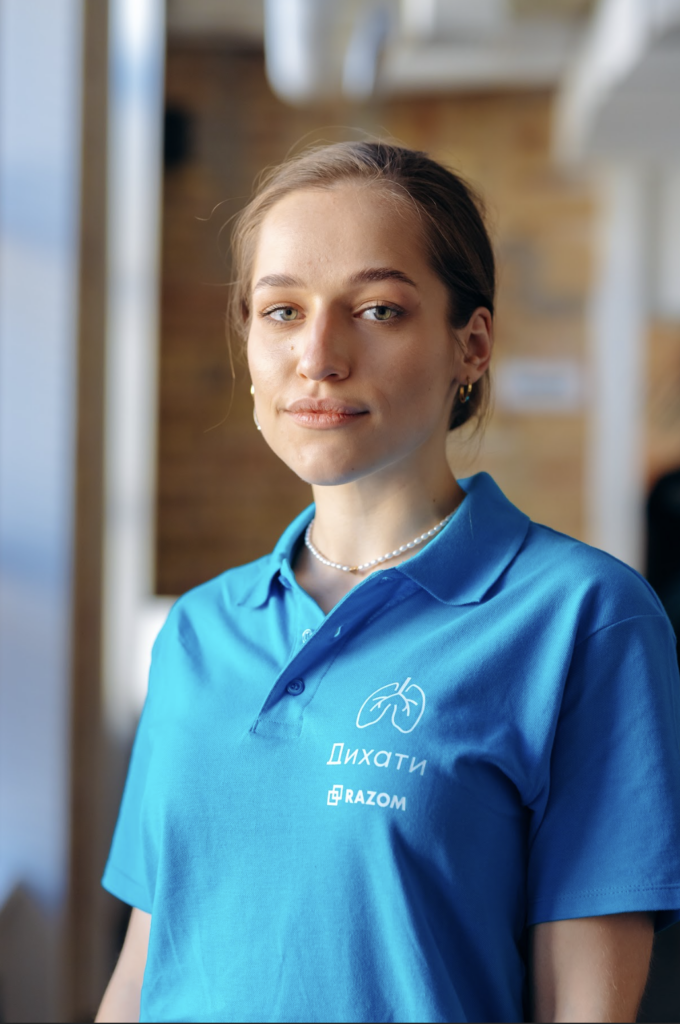
Alyona Bezlehka: First Day Back Turns into a Nightmare
For rehabilitation specialist Alyona Bezlehka, it was her first day back at work after a vacation. She had been eagerly anticipating reuniting with her patients. As the explosions began, she quickly led her patients to the corridor and then to the bomb shelter. Returning to her department on the 5th floor, she encountered her colleague, covered in blood and holding a child they couldn’t evacuate in time.
“The floor was covered in blood and dust. I am not a surgeon, but I saw bandages and started applying them to stop the bleeding,” she recounted. Among the chaos, one boy’s cries for his grandmother haunted her. He was in shock, shivering, and vomiting, with his hand covered in blood. The sight of injured children, medical staff on stretchers, and parents with bandaged heads was overwhelming. Her department was almost completely destroyed, with windows blown out and the ceiling collapsed. Despite the devastation, the motivation to help and the outpouring of support from the community kept her going.

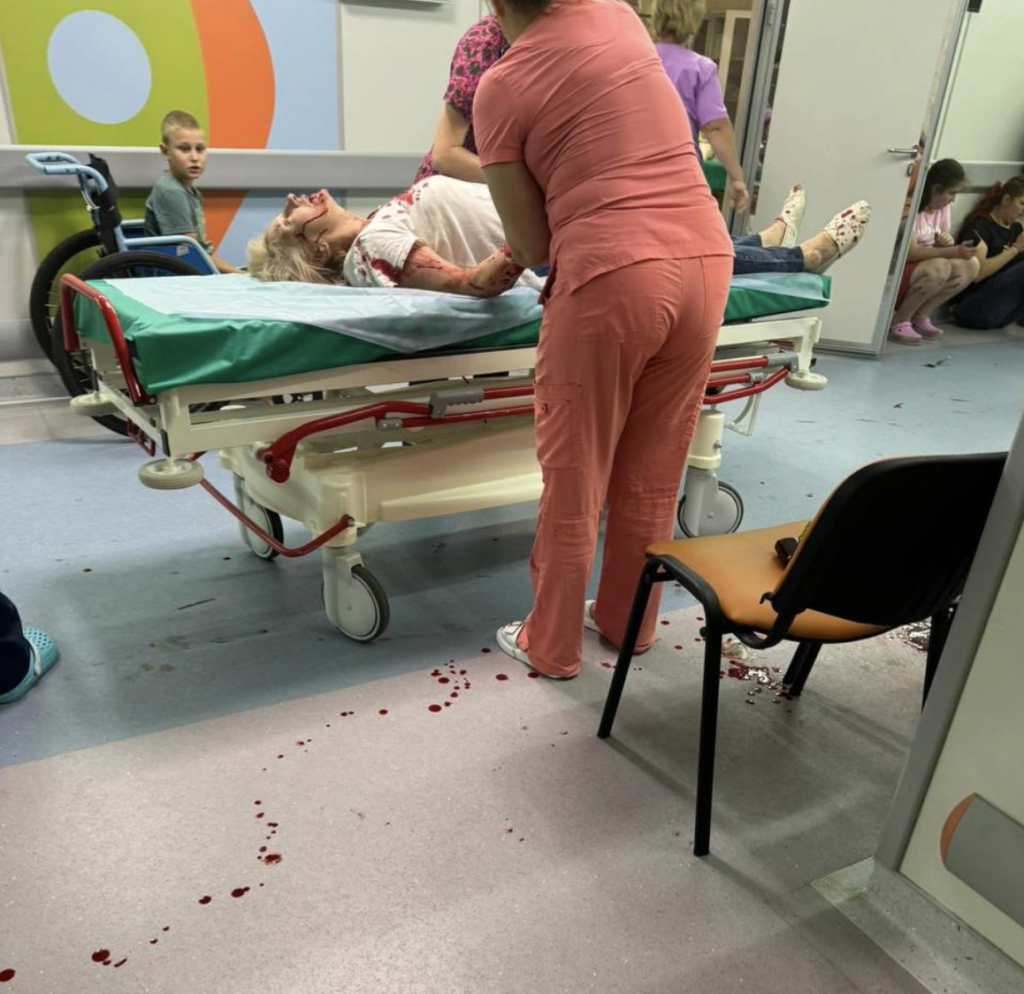
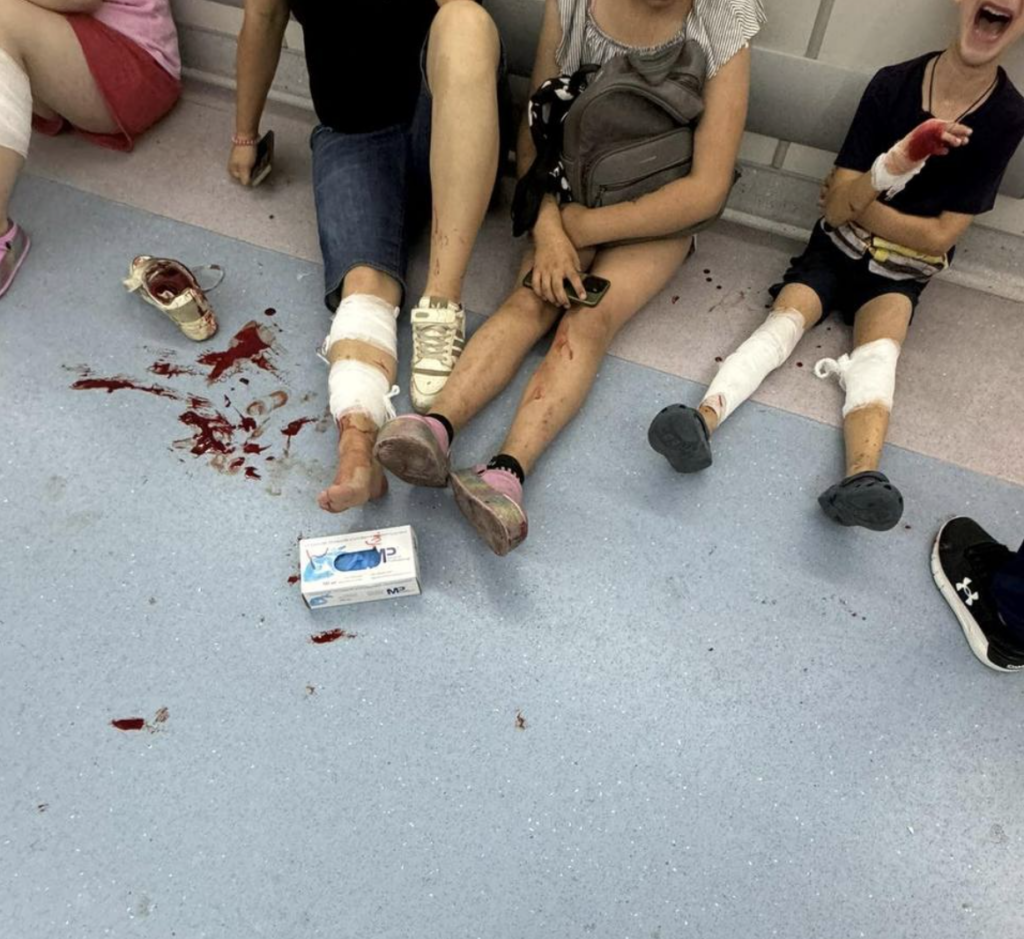
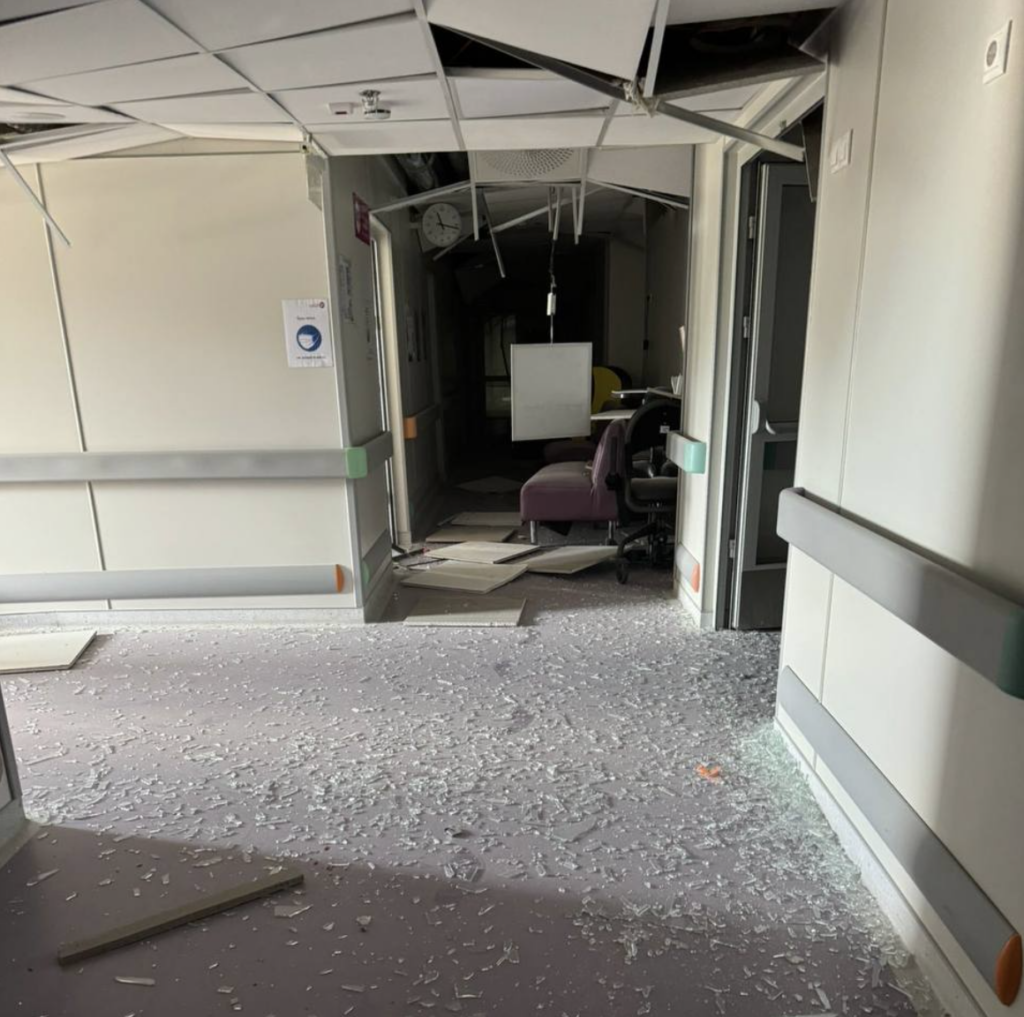
Valeriy Bovkun: Narrow Escape from Death
Valeriy Bovkun, head of the Department of Reconstructive-Plastic Microsurgery at Okhmatdyt, was organizing the evacuation of patients when the explosion occurred. “I was in my office when the sirens started, and then went out to check if the patients were moving to safe places. Moments later, the explosion occurred. My office was critically damaged: the blast wave tore out the window and threw it right onto my workspace,” he recounted. If he had stayed a moment longer, he would likely have been buried under the rubble. Thanks to the timely evacuation, most patients were unharmed, but five staff members were injured by glass shards.
Despite being in a state of shock, Valeriy and his colleagues immediately began providing first aid to the injured. “We applied bandages and sutures, examined the children, and did everything we could to help,” he said.
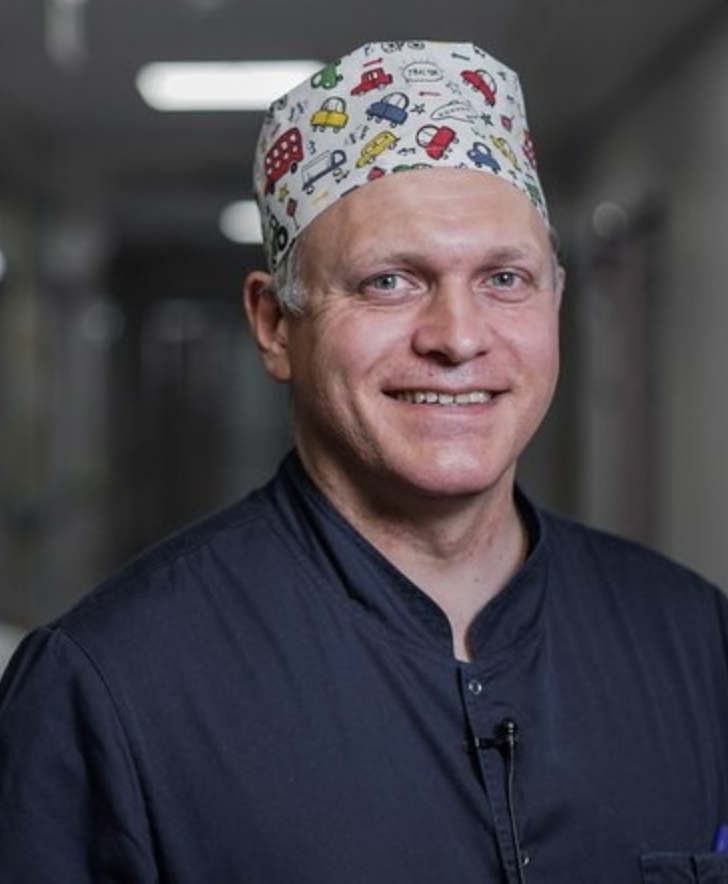
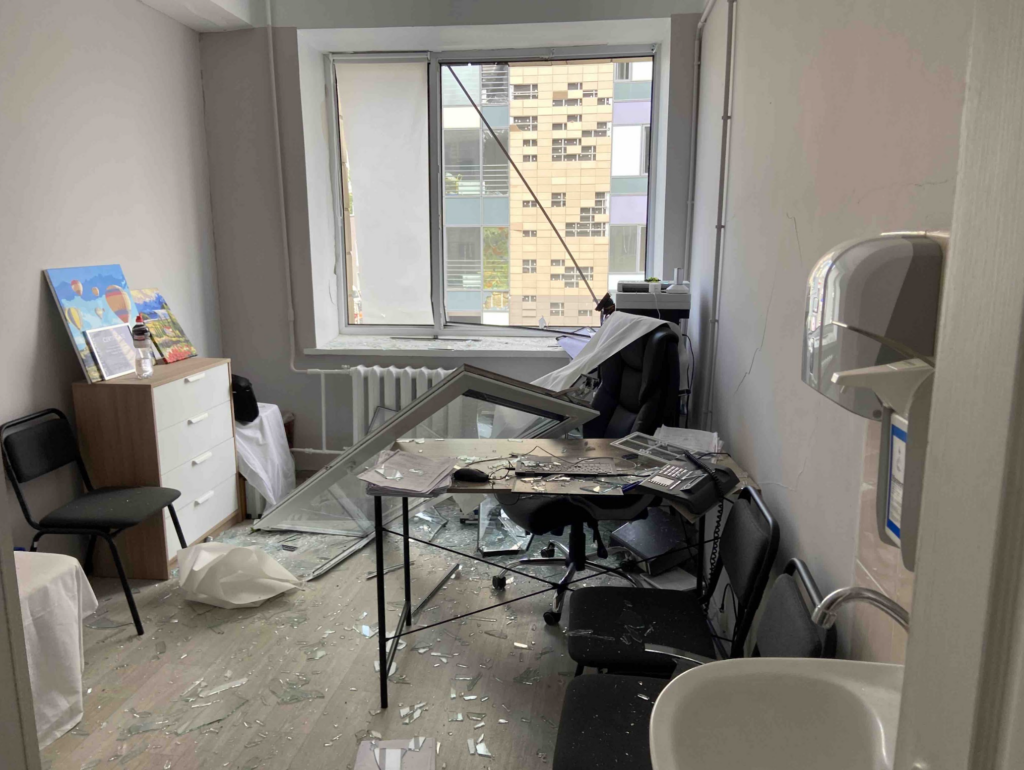
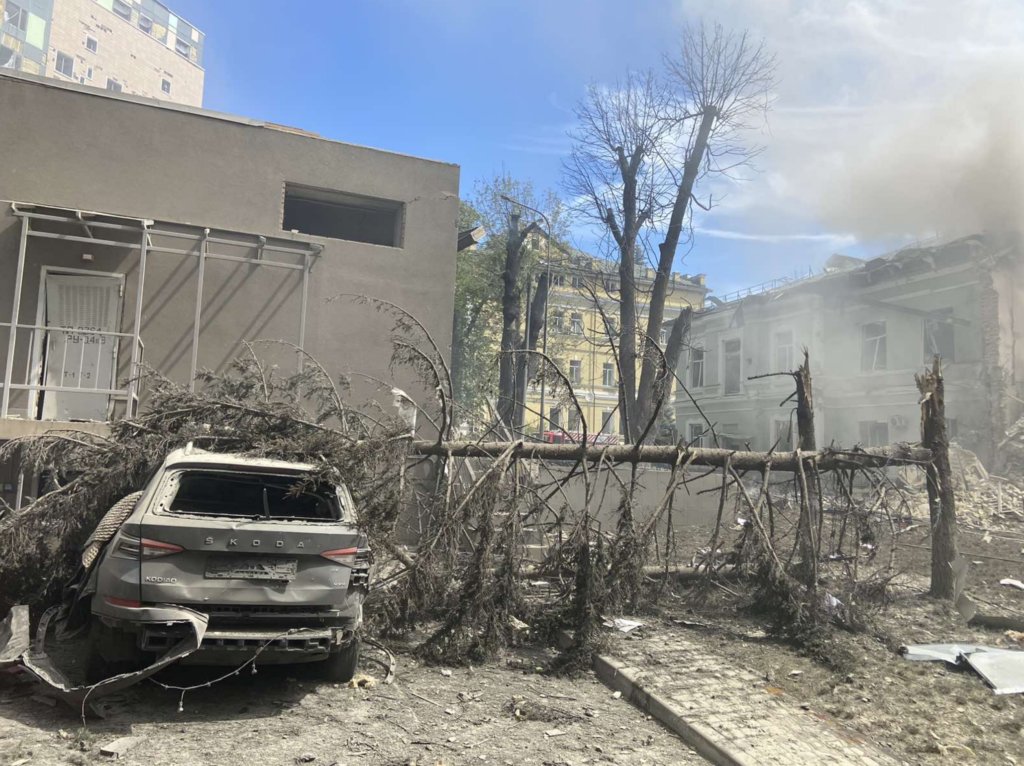
Roman Shevchenko: From Routine to Ruin
Roman Shevchenko, head of the Children’s Sleep Laboratory at Okhmatdyt, was in the laboratory next to the building hit by the missile. “By the time the explosion happened, we had not yet managed to get to the shelter, so after the impact, glass shards flew at us. I was slightly injured, but our nurse was severely cut by glass and bleeding. We started looking for something to bandage her with, but there was nothing nearby, so we went down to the floor, and there I provided her with first aid,” he explained. Despite the devastation, most of the laboratory’s equipment remained intact and continued to function. “We had a laptop on the windowsill, it was covered with glass but still working!” Roman recounted in astonishment.
He emphasized the unexpected timing of the attack: “Russia struck right after all the morning meetings were over and all the doctors had started working. We were already used to Russia striking at night, so this attack was completely unexpected.”
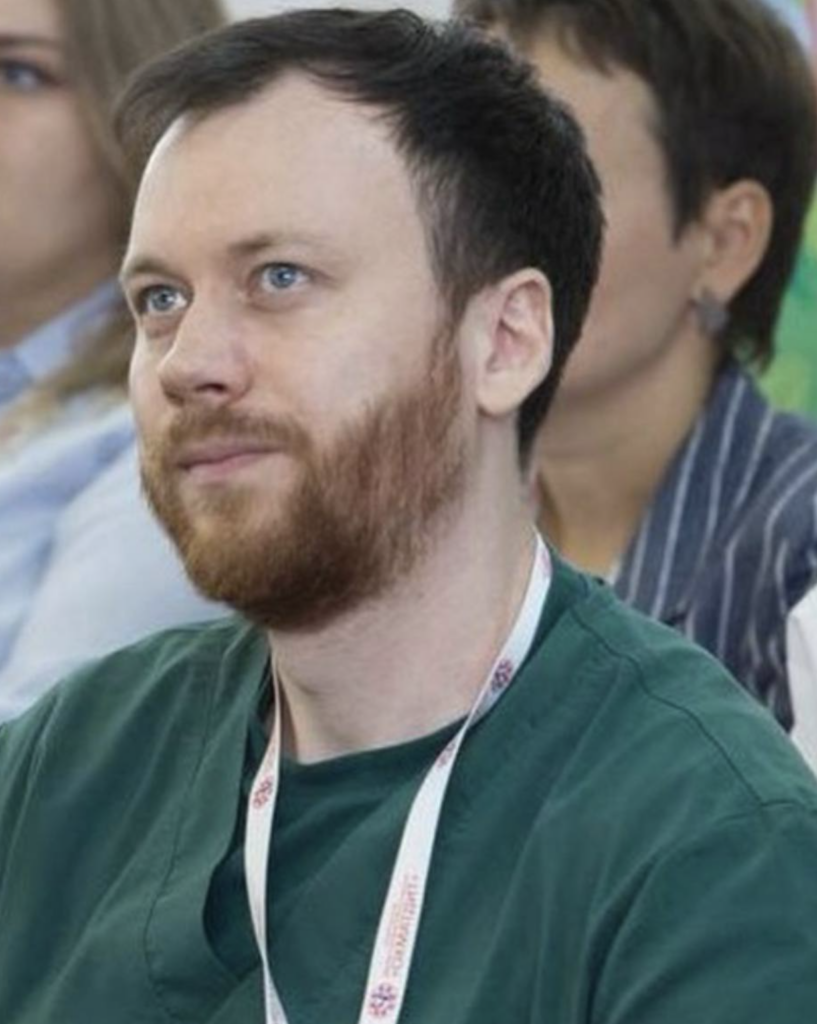
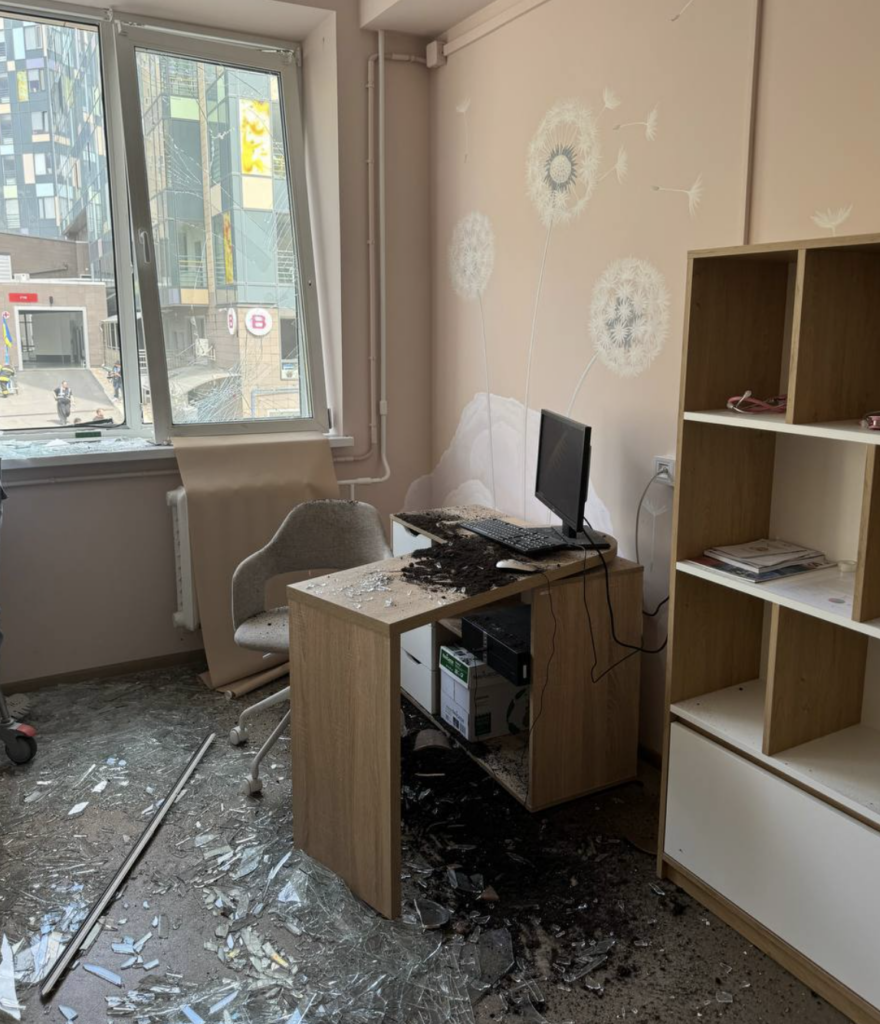
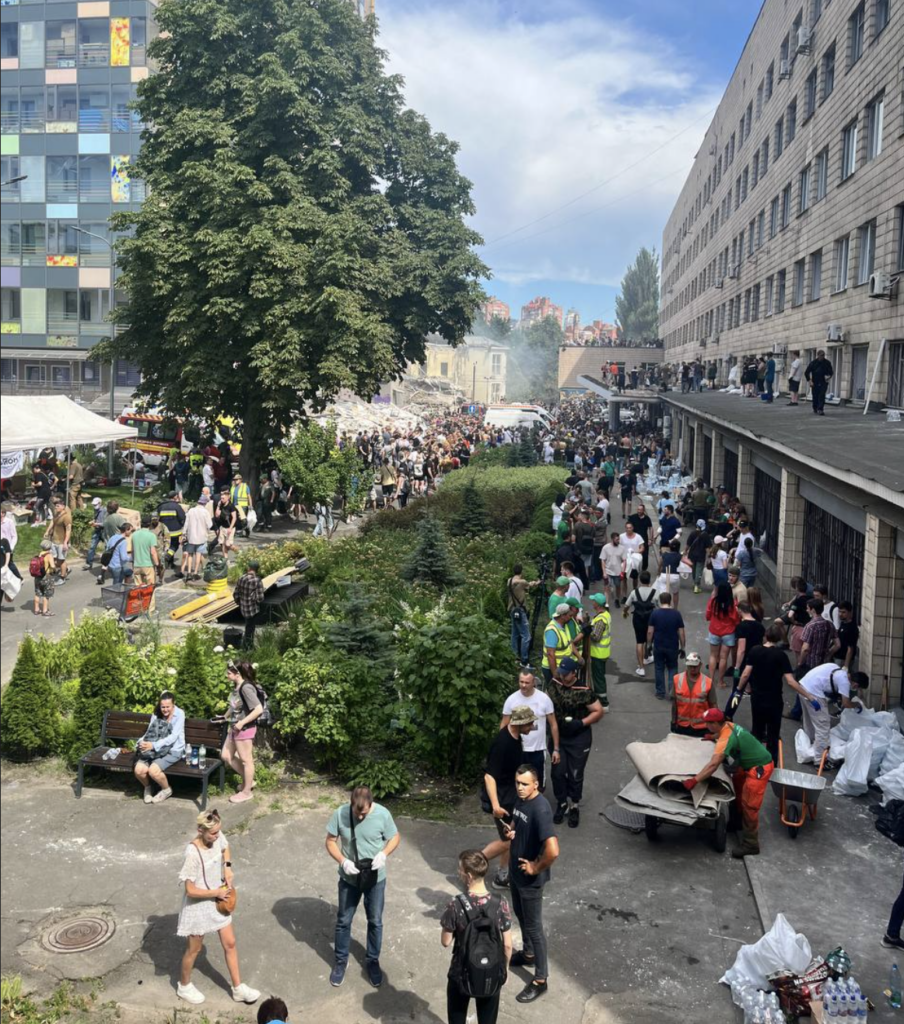
Photos courtesy of Okhmatdyt medical staff.
How You Can Help:
The attack on Okhmatdyt Children’s Hospital has devastated the lives of many innocent victims and shaken the global community. Razom Health is actively on the ground, mobilizing crucial supplies and support for those affected.
You can make a difference today by supporting our dedicated teams as they work tirelessly to aid the victims of the Okhmatdyt tragedy and other healthcare facilities in Ukraine that remain under constant threat of attack.
Donate now to provide immediate relief and assistance to those in need.
Razom Responds to Massive Russian Bombing of Ukraine, Including Major Children’s Hospital in Kyiv
July 8, 2024
Contact: press@razomforukraine.org
Razom Responds To Massive Russian Bombing Of Ukraine, Including Major Children’s Hospital In Kyiv
New York: Today’s bombardment of Kyiv’s Okhmatdyt Children’s Hospital by Russia was one of several strikes around Ukraine resulting in at least 30 deaths and 130 injuries nationwide. The massive attack demonstrates again that Putin sees no norm as too sacrosanct to violate, no war crime as too heinous to contemplate, and no child as too innocent to target in his quest for imperial domination over Ukraine.
The destruction of one of Europe’s leading children’s hospitals, specializing in complicated cases of cancer and heart disease in kids, constitutes a brazen assault on international law and the notion of human decency. It is part of a broader terror bombing campaign unleashed by Russia against Ukrainian civilian targets.
Today, Razom volunteers and staff joined hundreds of Kyivans on the grounds of the Okhmatdyt Children’s Hospital to provide immediate support and deliver gloves, protective equipment, and water. Since 2016, Razom for Ukraine (Razom) has been working with hundreds of hospitals throughout Ukraine and will continue to support their lifesaving work with supplies, expertise and funds.
“We are gutted by yet another indiscriminate and brutal attack on civilian infrastructure in Ukraine, particularly as innocent, critically ill children and their caregivers were the unfortunate victims,” said Dora Chomiak, Razom’s CEO, “Our colleagues across Razom are as determined as ever to save lives and to bring a lasting victory by delivering aid, and by advocating for a stronger U.S. policy that defends Ukraine against Russia’s violence.”
Currently, Razom is working with the leadership of the Okhmatdyt hospital, providing supplies to doctors and nurses enabling them to care for their patients. Razom is also cooperating with the Ministry of Health and with other nonprofits to continue supplying urgently-needed medical supplies and energy generation. The Razom Health program will continue to advance its goals of immediate and long-term assistance to support the patients of this world-class hospital and other healthcare facilities across Ukraine under constant threat of attack.
We anticipate more assaults in the days to come. As Ukrainian volunteers work to pull children out from under the rubble, one thing is clear: giving Ukraine the means to defend itself is the only thing that can prevent such heartbreaking scenes from being repeated.
If Ukraine were permitted to defend itself by striking military airfields in Russia, it could protect itself and its vital infrastructure. If Ukraine had been able to destroy the Russian bombers responsible for today’s attack before they took off, countless lives might have been saved.
Razom is calling on the White House to immediately change its policy restricting the use of U.S.-supplied weapons by Ukraine inside of Russia. Ukraine must be enabled to strike all legitimate military targets in Russia to properly defend itself.
Support for Razom’s emergency humanitarian response efforts can be made by donating today.
#####
Razom for Ukraine (Razom) was founded in 2014 and is a leading US-based nonprofit dedicated to supporting Ukraine. Razom, which means “together” in Ukrainian, is dedicated to upholding the principles of the Revolution of Dignity (Maidan) and actively contributing to the establishment of a secure, prosperous, and democratic Ukraine. We deliver on our mission through five program areas: Razom Heroes, Razom Health, Razom Relief, Razom Advocacy, and Razom Connect, which enable us to provide humanitarian aid and support to Ukrainians, and advance Ukraine’s interests in the U.S. Since 2022, it has deployed over $116MM in aid.
Razom at the Ukraine Recovery Conference 2024: Building a Stronger Future
The future of Ukraine is bright, and Razom was proud to be a part of the recent Ukraine Recovery Conference (URC2024) held in Berlin on June 11th and 12th, 2024.
This landmark conference, co-hosted by Germany and Ukraine, brought together over 3,000 attendees, including government officials, business leaders, activists, and dedicated Ukraine supporters. The goal was to chart a course for Ukraine’s recovery, reconstruction, and long-term success.
At Razom, we believe in the power of civil society, the “third sector,” to play a vital role in rebuilding Ukraine. Our presence at URC2024 was about amplifying the voices of Ukrainians and advocating for their needs in the reconstruction process.
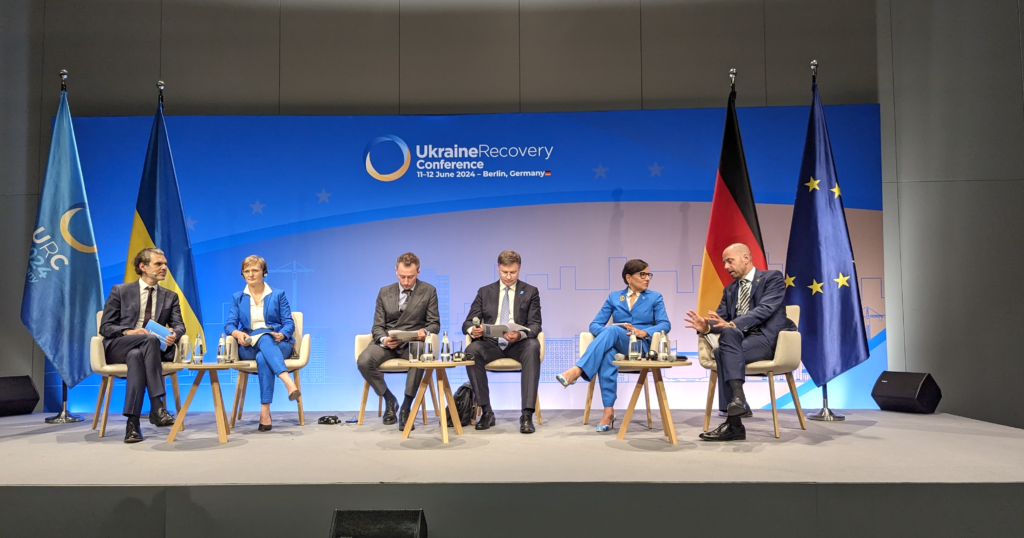
Seizing Russian Assets: A Major Step for Ukraine at the German Parliament
Razom’s busy week at the Ukraine Recovery Conference (URC2024) wasn’t just about sharing our story. We were involved in a critical parliamentary breakfast on seizing frozen Russian assets.
This historic event, co-hosted by the German Parliament, drew a record crowd and media attention. It directly influenced a powerful international letter urging the G7 to confiscate these assets. Learn more: HERE
Razom extends thanks to our German partners and applauds Yuliya Ziskina for her role in this success.
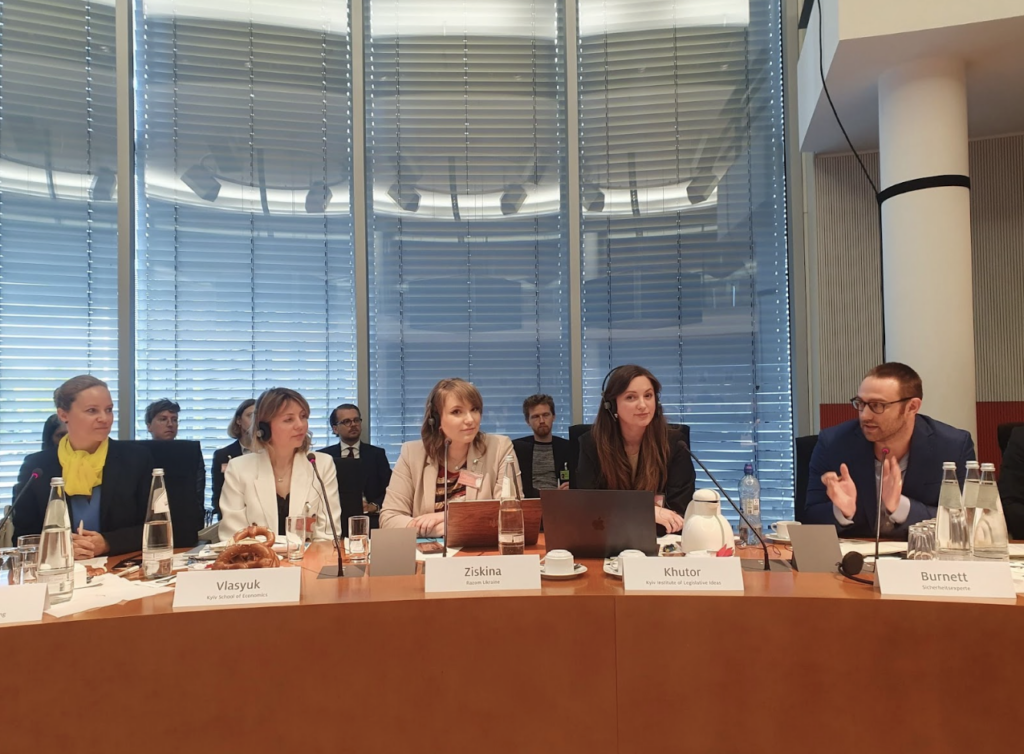
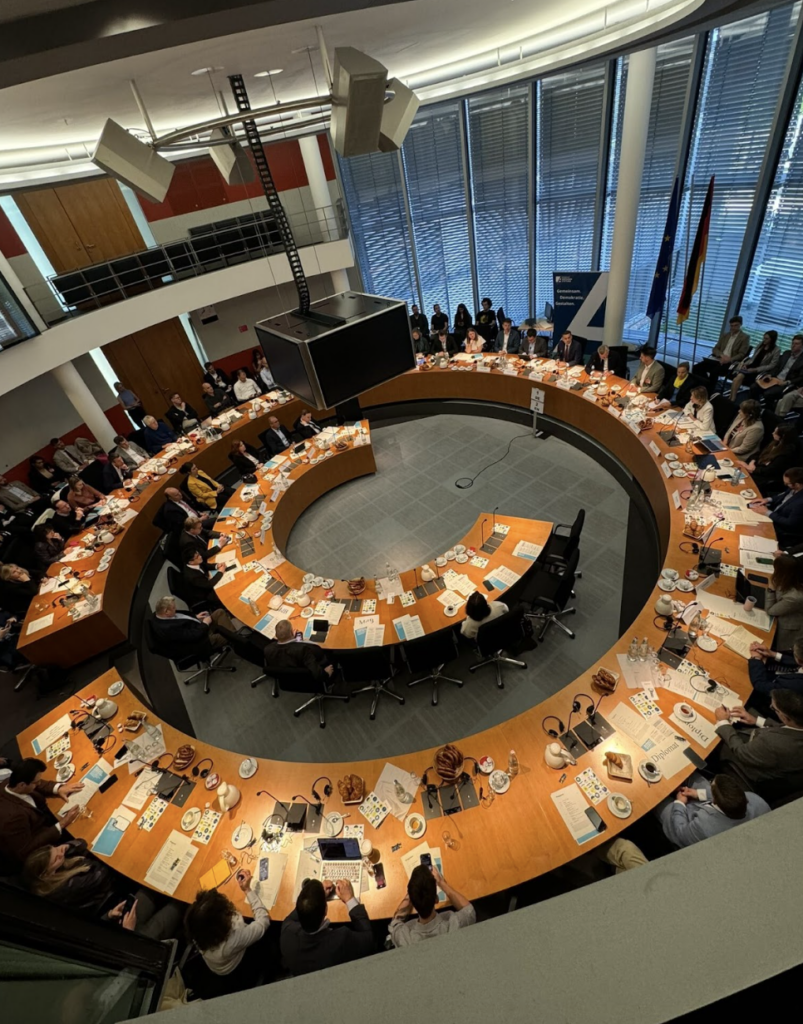
Building Bridges and Sharing Success
The Ukraine Recovery Conference was also about building connections and fostering collaboration. Razom seized the valuable opportunity to network with other civil society leaders from across Europe. This allowed us to share Razom’s story and the work we’re doing to support Ukraine on the ground.
One such connection proved particularly fruitful. We were excited to meet the team behind Himera, a Ukrainian tactical communication systems manufacturer. Razom actually purchases radios from Himera for our Razom Heroes Program, which equips Ukrainian first responders with vital communication tools! Learn more about Himera: HERE
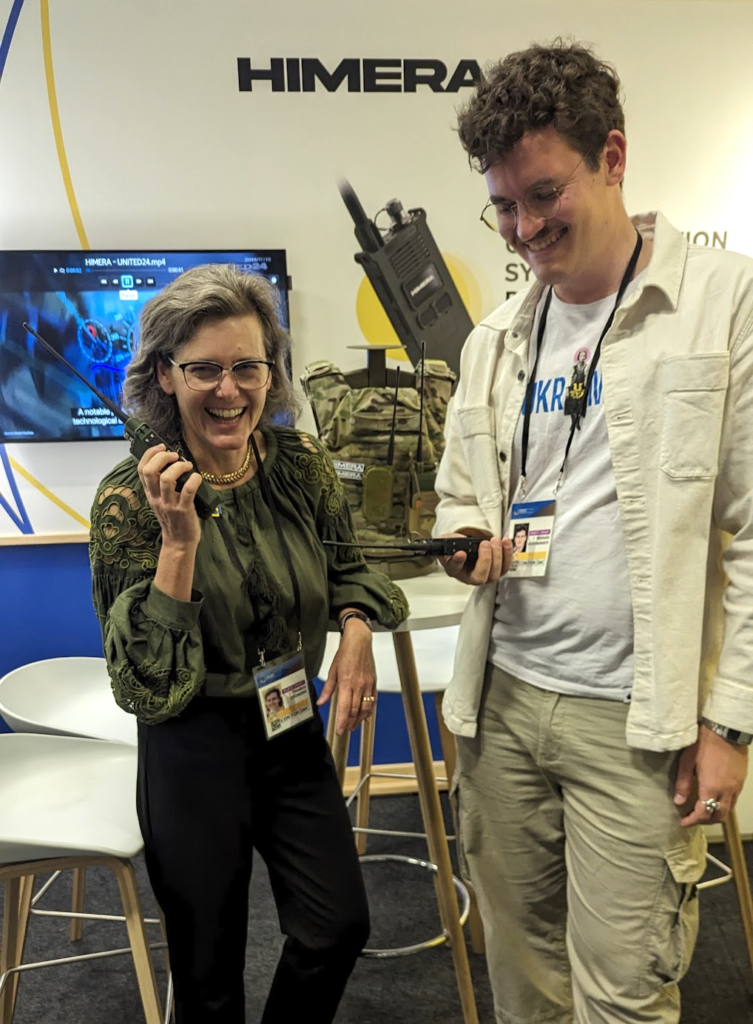
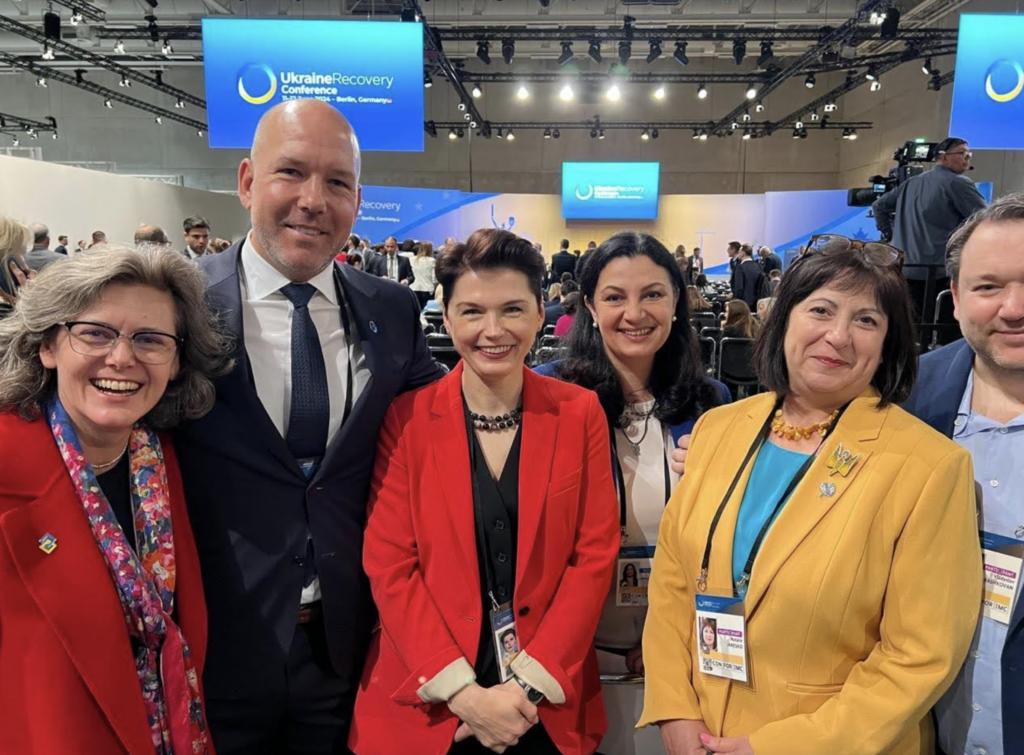
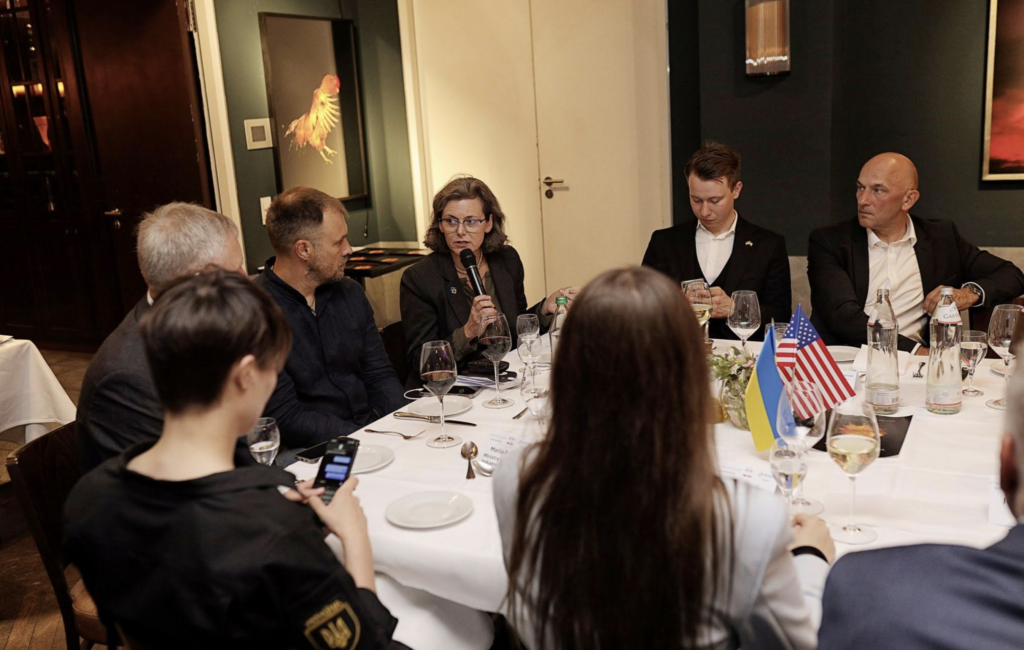
A Look Ahead: Rebuilding Together
URC2024 was a resounding success, demonstrating a strong international commitment to supporting Ukraine. Razom is energized by the collaborative spirit and sense of purpose that emerged from the conference. We are confident that by working together – government, businesses, civil society, and everyday citizens – we can build a brighter future for Ukraine.
We invite you to join Razom in our ongoing efforts to support Ukraine. Visit our Programs page to learn more about our work and see how you can contribute.
Let’s keep the momentum going! Together, we stand with Ukraine.
